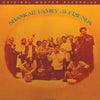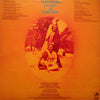



Ravi Shankar - Shankar Family & Friends (Ultra Analog, Half-speed Mastering)
Ravi Shankar – direction, spoken voice, sitar, surbahar, Moog synthesizer, backing vocals
Lakshmi Shankar – vocals, swarmandal, backing vocals
Jitendra Abhisheki – vocals
Tom Scott – saxophones, flute, handclaps
George Harrison – electric and acoustic guitars, autoharp, arrangement on "I Am Missing You" [click here to see more vinyl featuring George Harrison]
Shivkumar Sharma – santoor, shaker, backing vocals
Shubho Shankar – sitar
Alla Rakha – tabla, pakavaj
Emil Richards – marimba, percussion
Hariprasad Chaurasia – bansuri, cowbell
Ashish Khan – sarod, swarmandal, backing vocals
I. Subramaniam - violin
Palghat Raghu – mridangam
Harihar Rao – spoken voice, dholak
Kamala Chakravarty – backing vocals
G.S. Sachdev – bansuri
Sharad Kumar – bansuri
Pranesh Khan – dholak
Fakir Mohammad – tamboura
Nodu Mullick – kartal, tamboura
Krishna Temple – kartal
George Ruckert – sarod
Klaus Voormann – bass
Nicky Hopkins – piano
Jim Keltner – drums
Billy Preston – organ
Ringo Starr – drums [click here to see more vinyl featuring Ringo Starr]
Fred Teague – organ
Ed Shaunessey – drums
Dennis Budimir – electric guitar
David Bromberg – electric guitar
Vini Poncia – tambourine
Paul Beaver – Moog synthesizer
Malcolm Cecil – Moog synthesizer
Robert Margouleff – Moog synthesizer
Ray Cramer – cello
Al Casey – mandolin
Webb - esraj
Ronald Cohen – sarangi
Ray Pizzi – bassoon
Bobby Bruce – violin
Gordon Swift – violin
Gene Cipriano – oboe
Written by Ravi Shankar
A1 arranged by George Harrison
1 LP, standard sleeve
Original analog Master tape : YES
Half-speed Mastering
GAIN 2 Ultra Analog™ LP
Heavy Press : 180g
Record color : black
Speed : 33RPM
Size : 12”
Stereo
Studio
Record Press : RTI
Label : MOFI
Original Label : Dark Horse Records
Recorded April 1973 – early 1974 at A&M Studios, Los Angeles and FPSHOT Studio, Oxfordshire
Engineered & mixed by Norman Kinney
Produced by George Harrison
Originally released in 1974
To be reissued in 2022
Tracks:
Side A :
- I Am Missing You
- Kahān Gayelavā Shyām Saloné
- Supané Mé Āyé Preetam Sainyā
- I Am Missing You (Reprise)
- Jaya Jagadish Haré
Side B : Dream, Nightmare & Dawn
- Overture
- Part One: Dream - Festivity & Joy
- Part One: Dream - Love - Dance Ecstasy
- Part Two: Nightmare - Lust (Rāga Chandrakauns)
- Part Two: Nightmare - Dispute & Violence
- Part Two: Nightmare - Disillusionment & Frustration
- Part Two: Nightmare - Despair & Sorrow (Rāga Marwā)
- Part Three: Dawn - Awakening
- Part Three: Dawn - Peace & Hope (Rāga Bhatiyār)
Ultra Analog™ : The GAIN 2 Ultra Analog™ Series stems from the use of the Gain 2 system, mastered at half speed from the original master tapes where possible, capturing and uncovering as before undiscovered sonic information.
Half-speed mastering. In half-speed mastering, the whole process is slowed down to half of the original speed. A typical 33 1/3 rpm record is cut at 16 2/3 rpm. The source material is also slowed down (reducing the pitch in the process) meaning the final record will still sound normal when played back. Slowing the whole process down allows more time, which means the end result sounds better and is more efficient — allowing engineering to minimize the effects of inherent limitations within the vinyl format. The result is a more accurate and more open high-frequency response in the half speed vinyl when compared with a normal speed recording.
Ratings :
Discogs : 4,14 / 5



